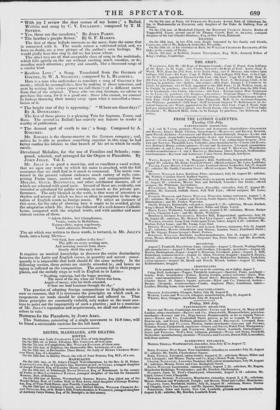Devotional Melodies, for the use of Families and Schools; com-
posed, selected, and arranged for the Organ or Pianoforte. By JOHN JOLLY. Vol. I.
Mr. JOLLY is so good a musician, and so excellent a vocal writer, that we open any work to which his name is attached, with the full assurance that we shall find in it much to commend. The music con- tained in the present volume embraces much variety of style, com- prising Psalm tunes, ancient and modern, and arrangements from MOZART, Gi.ccic, BEETHOVEN, and other celebrated masters, all of which are selected with good taste. Several of these are, evidently, not intended or calculated for public worship, so much as for private per- formance. The only blemish in the work, is that want of attention to rhythm and accent of which we have so often to complain in the adap- tation of English words to foreign music. We select an instance of this error, for the sake of showing how it ought to be avoided, giving the adaptation which Mr. JOLLY has followed of a well-known Catholic hymn, compared with the original words, and with another and more correct version of them.
" Adeste fiddes, heti triumphantes, Yenite, venue in Bethlehem, Natumvidete, regem angelorum, Venite adoremus Dommum."
The air which was written to these words, is tortured, in Mr. JOLLY'S book, into a Long Metre- " 0 God, how endless is thy love !
Thy gifts are every evening new, And morning mercies from above Gently distil like early dew."
It requires no musical knowledge to discover the entire dissimilarity between the Latin and English verses, in quantity and accent : conse- quently it is impossible that both should fit the same melody. In the following version, these points are strictly attended to ; and hence no injury is inflicted on the composition. The accents fall in their proper places, and the melody sings as well in English as in Latin-
" Exulting, rejoicing, hail the happy morning, The morn of the v when our Christ was born, Angels of mercy, who his birth attended, bear our loud hosannas through the sky."
The practice of adapting foreign compositions to English words is now so common, that it is necessary the principles on which such ar- rangements are made should be understood and adhered to. That these principles are constantly violated, only makes us the more anx- ious to point out the impropriety of such a practice ; and to a musician of Mr. JOLLY'S reputation and acquirements, we shall not address our- selves in vain.



























 Previous page
Previous page